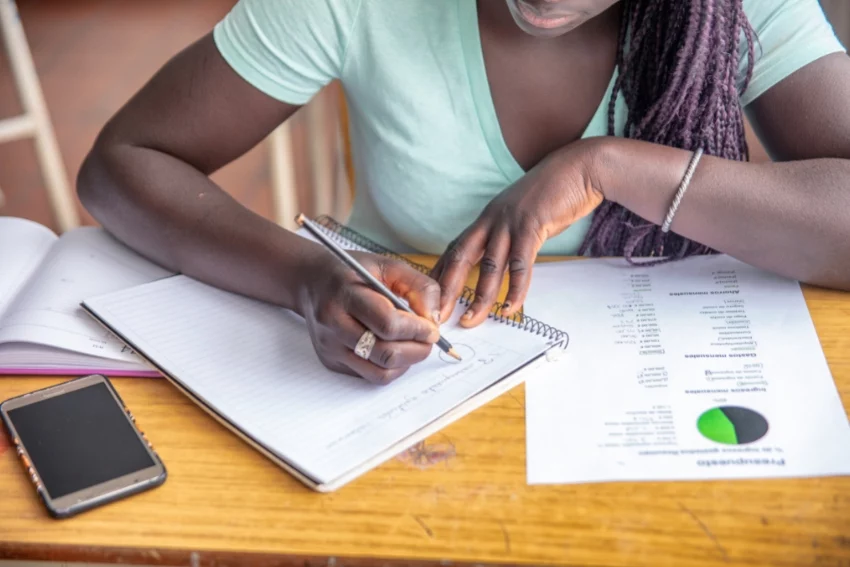Do you feel like the GCSE Maths exam is creeping up on you faster than you can keep up? Does the thought of achieving a top grade in less than two months seem impossible? It’s understandable to feel overwhelmed, but the truth is, with the right mindset and strategies, anything is achievable. In this article, we’ll share some tips, tricks, and common mistakes to avoid, so that you can maximise your study time and give yourself the best chance of getting a 9 in GCSE Maths. So, let’s dive in!
Mistakes to Avoid When Aiming for Top Grades
Avoiding common mistakes can help you to achieve better results in your GCSE Maths exam. Here are some mistakes that you should avoid:
Skipping topics – never do this when studying maths!
Maths is a subject that builds on previous knowledge. If you skip topics or don’t fully understand them, you will struggle with more advanced topics. Make sure you cover all GCSE maths topics and don’t leave any gaps in your understanding.
Not practicing enough (“enough” is a lot, we know…)
Maths is a subject that requires a lot of practice. If you don’t practice regularly, you will forget what you have learned. Make sure you practice every day and review your work regularly. Try the math solver from StudyX.ai to get detailed solutions and interactive learning, helping you excel in GCSE Maths.
Relying too much on calculators
Calculators are useful tools, but they should not be relied upon too heavily. You still need to be able to perform basic calculations without a calculator. Make sure you practice mental maths and basic calculations.
Not checking your work (you might lose couple of points just because you miscalculated)
It’s important to check your work for errors. Even small mistakes can lead to incorrect answers. Take the time to review your work and check your calculations.
Not understanding the exam format
To avoid failing GCSE Maths, start by making sure you understand the format of the exam and the types of questions you’ll be asked This will help you to prepare more effectively and avoid surprises on exam day. For this, you can do GCSE maths past papers and then review the mark schemes.
How Hard Is It to Get a 9 in GCSE Maths? Study Techniques

Here are some effective study techniques that you can use to prepare for your GCSE maths exam:
- Practice past papers. Practicing past papers is an effective way to prepare for the exam. It will help you get a sense of the type of questions that will be asked and the format of the exam.
- Use flashcards. Flashcards are a great tool for memorising formulas, concepts, and key terms. Create flashcards for the topics you struggle with and review them regularly.
- Take breaks. Taking regular breaks is important for maintaining focus and avoiding burnout. Take a 10-15 minute break every hour or so to rest your mind and recharge.
- Seek help. If you are struggling with a particular topic, don’t be afraid to ask for help. Speak to your teacher or tutor, or seek help from online resources.
- Use visual aids. Visual aids such as diagrams, charts, and graphs can help you understand complex topics more easily. Use them to supplement your notes and textbooks.
- Mocks. Join online free GCSE mocks and get feedback on your exam paper. This can help you assess your strengths and weaknesses and prepare for the real deal as much as you can.
Step-by-Step Study Plan to Get a 9 in GCSE Maths
Time management is a critical skill to master when preparing for any exam, especially one as significant as the GCSE maths. Here are some tips to help you manage your time effectively:
- Create a study schedule. Make a detailed plan of what you need to study and when. Allocate specific time slots for each topic or chapter, and make sure to take breaks in between study sessions.
- Prioritise. Focus on the most important topics first. If you’re struggling with a particular area, allocate more time to it. Remember to give yourself sufficient time to revise and practice previous topics.
- Avoid distractions. Try to eliminate anything that may distract you during study sessions. Put your phone away, avoid social media, and find a quiet place to study.
- Take breaks. Taking regular breaks can help prevent burnout and help you stay focused. It’s essential to take short breaks between study sessions and longer breaks when necessary.
- Stay organised. Keep your study materials organised, including your notes, textbooks, and past papers. This will help you avoid wasting time searching for information during study sessions.
Test-Taking Strategies
- Read the instructions carefully. Before starting the exam, read all instructions and questions carefully. This will help you understand what the question is asking, how many marks are available, and what format the answer should be in.
- Answer easier questions first. Start with the easier questions, as this will help you gain momentum and confidence. It will also help you manage your time better and leave you with more time to tackle the harder maths questions.
- Show your working. When solving a problem, make sure to show all your working. This will help you get partial marks if your final answer is incorrect. Plus, it will make it easier for the examiner to understand your thought process.
- Use diagrams and graphs. Use diagrams and graphs to represent data or to illustrate solutions to problems. This will help you visualise the problem and make it easier to understand.
- Don’t leave any questions unanswered. Even if you are unsure of an answer, make an educated guess. You never know, you might get some marks for your attempt.
- Check your answers. Take the time to review your answers and check for any errors or mistakes. Make sure you have answered all the questions and have shown your working.
How to Get Better at GCSE Maths Quickly

Here are some tips for staying motivated:
- Set achievable goals. Make a plan and set achievable goals for yourself. Break down larger goals into smaller ones, so you can track your progress and celebrate small wins along the way.
- Use positive self-talk. Stay positive and believe in yourself. Use positive self-talk to help boost your confidence and stay motivated.
- Reward yourself. Set up a reward system for yourself. After completing a difficult task, treat yourself to something you enjoy, such as watching an episode of your favourite TV show or eating your favourite snack.
- Visualise success. Imagine yourself achieving your goals and succeeding on your exams. Visualise what it will feel like to accomplish your goals, and use that as motivation to keep pushing forward.
Remember, staying motivated is key to achieving success. Read more on how to stay motivated during your GCSE revision.
Best Resources to Revise for GCSE Maths
When it comes to practicing for GCSE maths exams, there are plenty of resources available to help you prepare. Here are some of the most effective practice resources:
- Past Papers: One of the best ways to prepare for your GCSE maths exam is to practice with past papers. Working through past papers will help you become familiar with the format of the exam and the types of questions that you will be asked.
- Websites: There are a number of websites that offer practice questions and tests for GCSE maths. Some of the most popular include Mathswatch, Corbettmaths, and Hegarty Maths. These sites offer a variety of resources, including video tutorials, practice questions, and quizzes.
- Apps: There are also a number of apps that can help you practice for your GCSE maths exam. Some of the most popular include Khan Academy, MyMaths, and Mathway. These apps offer a range of features, including video lessons, practice questions, and step-by-step solutions. You can even find something on Youtube! Here are the top 10 Youtubers for GCSE revision.
- Textbooks: Textbooks are a valuable resource for practicing GCSE maths. They provide clear explanations of key concepts and often include practice questions and quizzes to test your understanding.
By using a combination of these resources, you can create an effective study plan and feel confident and prepared for your GCSE maths exam.
Conclusion
In conclusion, getting a 9 in GCSE maths may seem like an impossible task, but with the right mindset and motivation, it is definitely achievable. Remember to avoid common mistakes and utilise various practice resources.
However, if you still find yourself struggling to understand certain concepts or need additional guidance, don’t hesitate to seek help from GCSE maths tutors. Edumentors’ tutors have recently gone through the GCSE experience and now are studying at top UK universities. They can provide valuable insights, tips, and personalised support to help you succeed in your exams.
With dedication, hard work, and the right resources, you can reach your goal of achieving a 9 in GCSE maths. Good luck!
FAQ’s
How do I get a 9 in GCSE Maths?
Improving in GCSE Maths starts with identifying your weak areas. Break topics into manageable chunks, practise regularly, and don’t just memorise, aim to understand the methods. Use revision guides, online videos, and worksheets, and consider working with a tutor to get personalised support.
How should I revise for GCSE Maths?
Effective revision includes a mix of active recall, practice questions, and exam-style papers. Use flashcards for formulae, work through past papers under timed conditions, and focus on mastering common question types. Don’t forget to review your mistakes, it’s one of the best ways to learn and avoid repeating them.
How many marks do you need to get a 9 in GCSE Maths?
The exact number of marks needed for a grade 9 varies slightly each year depending on the exam board and overall performance nationwide. Typically, you’ll need to score around 80–85% across all papers to secure a grade 9, though this can fluctuate.
How hard is it to get a 9 in GCSE Maths?
Achieving a grade 9 in GCSE Maths is challenging, it places you in the top few percent of candidates nationally. It requires deep understanding, precision, and strong problem-solving skills. However, with a clear study plan, lots of practice, and focused revision, it is absolutely achievable.









